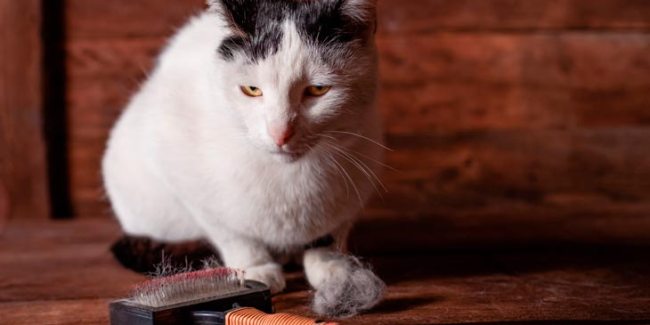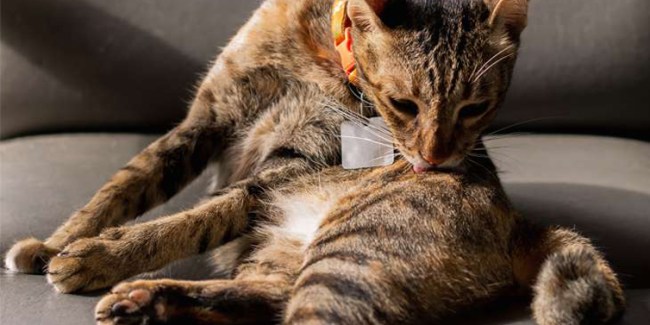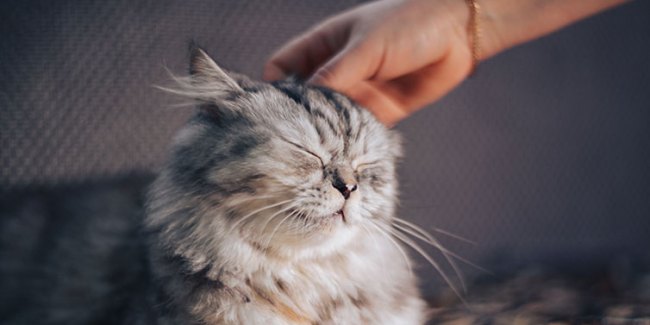I’m worried about my cat’s cough
If your kitty just coughs occasionally, it’s not really a problem. Sometimes your cat might make retching noises when bringing up a hairball, but that’s not actually coughing. We all cough sometimes – it’s the body’s natural way of clearing the respiratory system of mucus and foreign particles – but it might worry you to hear your cat coughing. Bear in mind though that our cats have the habit of concealing illnesses, so if your cat develops a real cough, then you should investigate further.
If your cat has been coughing for more than a few days, if the cough isn’t productive (he/she doesn’t bring up mucus or a hairball), or if it is severe or recurs, then you should consult your vet, who will look for the cause.
CATS

Why is my cat coughing?
There are several possibilities:
Respiratory Infections
These are the most common cause of cats coughing, particularly those cats who live in highly-populated places, such as shelters.
Bacteria and Viruses
Bacteria, such as Bordetella bronchiseptica, which is found in highly-populated places, such as animal shelters, are a fairly common cause of feline coughing. Symptoms of infection by these bacteria include sneezing, coughing, eye discharge and may eventually result in problems with breathing. These bacteria are spread by nasal and oral discharges and can cause symptoms which can be mild or very serious. Viruses, such as Feline Rhinotracheitis Virus – also known as Feline Herpes Virus – are not usually a cause of cats coughing, unless a secondary bacterial infection develops.
Heartworm
Although not commonly found in South Africa, a parasite called Dirofilaria immitis is responsible for heartworm infection, which is preventable but may also be fatal. Mosquitoes carry the larvae from one animal to another. The larvae then travel into the blood vessels of the heart and lungs and mature into adult worms.
Cats may develop serious respiratory symptoms, unlike dogs. Felines may have no symptoms of heartworm infection, or they may have signs like coughing, wheezing or difficulty breathing or vomiting. The more severe respiratory symptoms are known as heartworm associated respiratory disease, or HARD, which may be fatal, even in an otherwise healthy cat.
Heart Disease
Heart disease usually develops in cats, often due to other health problems such as high blood pressure or hyperthyroidism, but it can also be caused by a genetic predisposition. Hypertrophic cardiomyopathy, or HCM, is the most common cause of heart disease, affecting around 15 %, or more, of cats. It causes the muscle of the heart to get thicker, preventing good functioning of the heart. It is most common in certain breeds, such as Persians, Chartreux, Sphynx, British Shorthair, Ragdoll and Maine Coon.
A cat with heart disease may have no symptoms or may have difficulty breathing, shortness of breath, fast breathing, wheezing, coughing, an irregular heart beat or murmur (which does not necessarily indicate heart disease) and pale/blue gums. Weakness or paralysis in the back legs may also occur. Heart disease in cats may also cause weight-loss, anorexia and inactivity. Unfortunately, this disease may result in sudden death.
Asthma
In cats, unlike humans, the terms ‘asthma’ and ‘chronic bronchitis’ are used to indicate chronic lung disease, allergic bronchitis or allergic airway disease. It is difficult to diagnose – other causes of respiratory symptoms need to be ruled out – as the cause is not clear. It isn’t common though, affecting only 1-5 % of cats…
Symptoms, which may be mild or more severe, can appear suddenly, and may include coughing, wheezing and difficulty breathing.
So, how will my vet diagnose the cause of my cat’s cough?
Many of these possible causes of your cat’s cough may be difficult to diagnose. A cat’s cough may be a symptom of many conditions. Your vet will need to know your cat’s breed, age, living conditions, and behaviour habits to help him/her to identify the cause. You will be able to help your vet by describing the details of your cat’s cough, including, for example, whether your cat coughs mostly at night and whether there are any triggers which make him/her cough.
Your vet will do a comprehensive examination of your kitty and, if required, other diagnostic tests such as echocardiography, if necessary.
What kind of treatment can I expect for my cat?
Treatment depends on the diagnosis but if a bacterial infection is responsible, your vet may prescribe antibiotics. For heart disease he/she may prescribe special heart medication and for asthma your cat may be given anti-inflammatories.
Is there anything I can do to prevent these illnesses?
You can help to prevent some of these problems with vaccinations (which help to prevent serious viral and bacterial respiratory illnesses) and heartworm preventatives, especially if your cat will be in an area where heartworm is commonly seen.
Any other tips?
Take your kitty to the vet as soon as you notice worrying symptoms. The sooner the vet can diagnose and treat the cause of your cat’s cough, the better.
ZA-NON-210800013
Subscribe to our Newsletter
Get to know your furry friend better! Sign up for all things dog- or cat-related.
The Hairy Facts about the dreaded hairball
12 April 2021
Help! My dog’s barking mad! Volume 2
12 April 2021
Your Itchy, Scratchy Cat – All About Cat Skin Problems
12 April 2021
The Dog’s Diet: A Bone of contention?
01 April 2021
Mango Fly Worms: How to Spot and Eliminate them
Posted on November 28,2019
Managing Mange And Mites In Your Dog
Posted on June 11,2018
Why Do Cats Purr and How? Learn What Your Cat Is Saying
Posted on October 14,2020
How to Get Rid of Ear Mites in Dogs
Posted on November 06,2019









